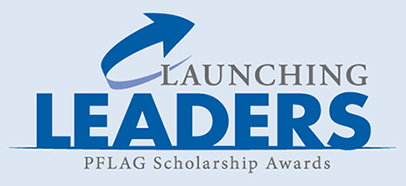Congratulations 2022 PFLAG SDC Scholarship Recipients!
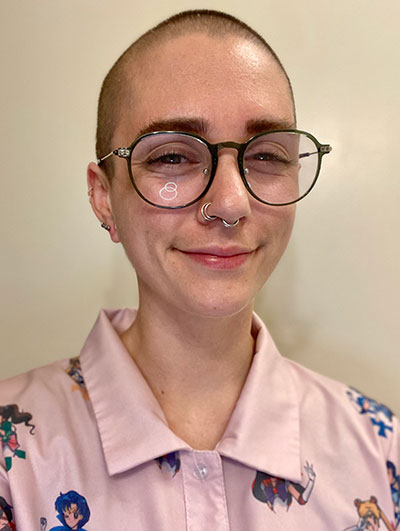
Mary Wagner Memorial Scholarship
Donors: Marilyn & Art Carpenter, Sharon Murphy
Ashton Lawson
Ashton Reks (He/They) is a 26-year-old, First-generation Junior at Cal State San Marcos. He is a double major in Sociology and Women, Gender, and Sexuality studies, and works as an Administrative Assistant and Peer Educator at the university’s LGBTQA Pride Center. He also serves as a Special Consultant and Student Mentor for the Office of Inclusive Excellence and serves on the President’s Inclusive Excellence Advisory Council. He plans on continuing his education to become a professor of Gender Studies and Queer Theory. He has a small background in performing and public speaking and is moderately fluent in ASL. In his spare time, he likes to do art such as drawing, painting, and sculpting and also enjoys playing video games.
In the past year, I have continued to stay employed at my University’s LGBTQA Pride Center as a Peer Educator. On a daily basis through my job, I help facilitate a safe and brave space on campus for students to be able to hang out in between or after/before classes. My weekly duties involve not only keeping a safe and clean environment, but also helping manage and facilitate educational, social, and artistic events for the community. Some examples of past events I have come up with and facilitated were: a trans social for students to find other trans students on campus, a weekly sex-ed hour where I took suggestions from students to cover various topics that aren’t covered in national sex education (especially for queer people), as well as a family support group before each holiday break for students to express their concerns about traveling back to families that are homophobic or that they may not be out to yet. Aside from events held in the space, I also started our center’s first “Roommate Survey” after talking to many students and also seeing my best friend struggle as a queer person to find housing in the area. For this survey, I created a google form with various common questions people ask potential roommates and had the students input the areas they were willing to move to or had an open room available. From this form, I then created a spreadsheet, color-coded each area of the surrounding county people would want to move to, and created an email template in which I input information for each student that filled out the survey. In this template, I thanked the student for participating in the survey, gave them a list of people looking to move to the same area(s) (along with pronouns and emails), and then gave them an example prompt on how to get the conversation started. I’ve also made my way into our university’s Office of Inclusive excellence to further try to help the students feel seen by the university. Under this office, I hold the position of a student mentor and a presidential committee member. For my student mentor role, I and four other students meet with new tenure-track professors to further push for inclusiveness in the classrooms. For my presidential committee member position, I get to meet with our university’s president, President Neufeldt, and discuss with the committee issues that students may be facing, bringing to light the implications that come along with various intersecting identities and how that can affect one’s academic success. To me, having representation for everyone is how we can solidify our dreams within ourselves. I use to be a Girl Scout Troop Leader and a nanny. For Girl Scouts, though I learned a lot of amazing things through the organization, there was still representation I didn’t see, and that made me feel as though people like me, people who are transgender, can’t do big things. Being a Troop Leader, and working my way up to a Lead Leader showed me that I can do anything no matter what I look like, and working with a family hands-on also showed me the importance of children being able to be themselves. From that experience, I now have the pleasure to know my little Nora, who has a military family, and still feels brave enough to say she feels like “both a boy and a girl”. Since then, it’s been branded on my heart that everyone deserves to be who they are. For the future, there is so much to do it almost seems impossible to narrow it down. My first and foremost task in order to do anything is to finish school. After graduating with two bachelor’s degrees in Spring 2023, I’m looking to jump right into my Ph.D. in Gender Studies. I plan to become a professor and gender researcher, and through being so unapologetically queer myself, I hope to be that representation for those who might not have it. I didn’t grow up with any queer representation and seeing what that kind of impact can do for others is enough to keep going.
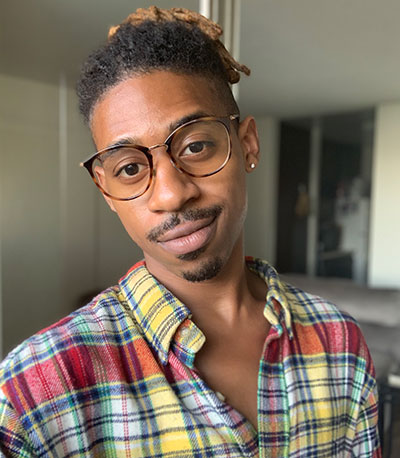
John Bessemer Memorial Scholarship
Donors: PFLAG San Diego County, Scott Bernard
Matt Ford
Matt Ford is pursuing their Master of Fine Arts degree in Writing at the University of California, San Diego where they create art exploring liberation theology, black queer life, cosmology, and music. After graduating, Matt intends to publish their writing, continue teaching, pursue a Ph.D. in Black Studies, and develop a publishing platform that would help people write, edit, and share literary and artistic work. Matt previously studied anthropology at Vassar College in addition to a yearlong domestic exchange at Morehouse College.
I have invigorated more people to articulate freedom through writing in the last year than I have in my ten years of teaching. Starting my MFA Writing program at the University of California, San Diego (UCSD) in autumn 2020, I was a teaching assistant for Thurgood Marshall College’s Dimensions of Culture program where I taught introductory social justice theory, history, composition, and research skills. The program culminated last spring to where my students researched and developed projects that responded to campus issues in ways that would positively impact the community. While the students developed their projects, I crafted my own. DOC TAs had the option to plan, implement, and improve an anti-racist teaching strategy and receive a certification in Anti-Racist Writing Pedagogy. My strategy was to mold student-teachers and teacher-students by emphasizing class discussion and empowering students to consult one another for help with their writing. I highlighted what students had done well in my grading practices and gave thorough commentary on how to better articulate their main ideas rather than overcorrect their language, especially for ESL students. As a result, my students consistently gave me exceptional reviews and told me verbally or in writing how my comments helped them feel more confident as writers and as people.
My strategy evolved when I taught nonfiction this winter quarter. Personal essay-writing was daunting to many of my students as they reached into themselves to tell stories often filled with trauma and self-denial in their mostly short lives. As one of my students quoted me in her final reflection, “writing nonfiction asks a lot of you.” I felt challenged to dig deeper within myself to support them with additional culturally relevant multimedia materials. I also shared how I navigated—and am still navigating—my literary and educational journey while Black, non-binary, low-income, and neurodivergent. In turn, my students were more open in class and in their writing, including non-traditionally aged students. A disabled student, along with a few of her younger classmates, launched a disabilities student group and a disabilities studies journal while a father requested to switch to my workshop group because of the impact I made on him in the first week of class. My experiences as a creative writing teacher this year demonstrate that I am meant to teach and write for my life.
Of course, as a queer person, my journey isn’t linear. When I entered my program, I had a firm trajectory for achieving my goals: My partner and I would attend the James Baldwin Conference in France before leaving Chicago for what my godfather called our “shiny new life” in San Diego. My MFA thesis would be a partially finished (and published) collection of essays chronicling my twenties as a Black non-binary person navigating the American educational system. A year after graduating, my partner and I would marry; I would build my publishing company while he advanced his nursing career and moonlit as a musician. We would later move to Africa to pursue my Ph.D., travel the world, and raise a family.
The Universe, however, often has its own way of revealing our paths through lessons on the human condition. First, the world experienced a sweeping health crisis that showed us the value of connectivity. By the end of the year, my partner had passed away from longtime health issues just ten days after his 30th birthday. Halfway through writing the latest essay for my collection, I reasoned that I should probably finish my twenties before trying to write about them at length.
The world stopped. My world stopped. I needed to begin again after a cascade of endings. So, as I did with the passing of my father and grandfather during college, I decided to write my way out—and keep helping others articulate their own freedom, too.
I have many goals I want to accomplish before I die. I will change the world for the better by guiding people toward what Audre Lorde called the erotic, helping others reach inside that “deep place of knowledge” within themselves and, “…touch that terror and loathing of any difference that lives here. See whose face it wears.”
This fall, I started writing my MFA thesis, a novella that follows Myles, a Gemini non-binary music student tasked with arranging a song that would unshackle the African diaspora—and thereby all people, universe-wide, dead or alive—from spiritual oppression before the start of the Aquarian age. To make the arrangement, Myles must unravel their divine feminine and use the vibrational forces of Black music, particularly during the spiritual revolution of 1968-1979, to travel space and time and communicate with the dead. My thesis works toward a Black queer liberation theology that I intend to develop later as a Ph.D. dissertation (tentatively titled “Queertique”) and is stylized as an epic poem in biblical verse to queer spiritual texts. Throughout my two years with my partner, from our first date at a concert in Chicago to blasting his trusty speaker on our only beach day together in California, music was our connection to each other, to God, and to the outside world. This book became my self-salvation and I hope its message and techniques will change the world.
But this is just the beginning.
In my third year, in addition to completing my thesis, I will complete a chapbook of poetry, video, photography, and dance reflecting on lessons about intimacy, place, and the Divine learned during the pandemic. After completing my degree next spring, I plan to expand my now-small editing consultancy, 5D Publishing, into an interactive publishing platform that prioritizes marginalized writers; my novella will be the press’s prototype. I will also finish my book about my twenties, continue teaching creative writing and interdisciplinary research methods as a professor, and one day open a school for social justice and the arts.
I hope the reading committee agrees that I’m doing vital work that uplifts disenfranchised voices and chooses to support my intellectual and professional endeavors with a PFLAG Scholarship.
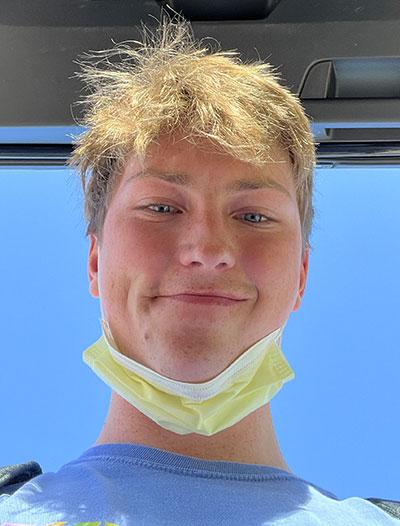
Rob Benzon Memorial Scholarship
Donors: Rob Benzon/Dan Ferbal Foundation
Erik Wieboldt
I’m so grateful to PFLAG and the Rob Benzon Memorial Scholarship for all their help. It really excites me that this scholarship exists for myself and for other members of the community. With this money I feel much more comfortable in my identity and studies. I’m very humbled to know that the work I do doesn’t go unnoticed and I want you to know that this scholarship has reaffirmed and reinvigorated my passion for our community and my service to it. Thank you sincerely for all that you do!
This year I am leading the youth program at the North County LGBT Center as a volunteer and facilitator. In this group, my co-facilitator and I gather together weekly with about a dozen 9-12 year olds to chat, draw art, and learn from one another. The group is structured so that during periods of historical importance to our queer, local, and minority communities, we lead conversations that are directed around these topics. For instance, during black history month we gathered to watch videos on the significant impact that black and queer people have on history and our community. We provided coloring pages of Marsha P. Johnson and Audre Lorde and asked open-ended questions to create natural dialogue about why these figures are important.
The insights the kids make in the discussions are truly awesome and inspiring especially considering their age. For instance, one of our kids saw a connection between Marsha P. Johnson’s STAR foundation and Unicorn Homes, our Host Homes Program for ages 13-24. It helped them see the real effect of the civil rights movement that we might take for granted. Seeing these kids freely have access to a history that I learned later in life gives me hope for our county. I’m confident that they’ll learn much more than I’ll ever know and will go on to do great, notable things.
The kids are given the ability to interact with, speak to, and/or lead our dialogue, within reason. In this open and safe space, many of our members open up about themselves and learn about the other queer folk in our group. Although they can be rambunctious sometimes, their abundant energy is usually aimed towards productive and fun relationships. It is a wonderful and inspiring thing to see Queer Joy and watch friendships form right in front of my eyes. It always puts a smile on my face to think that their joy and those friendships are the building blocks of their identity and the future of the community.
I grew up in a conservative, Catholic household where I wasn’t fully aware of queerness until I was a teenager. It took longer to unlearn my internalized homophobia and find security in myself and my sexuality. When I was a kid, I had no interaction with gayness and felt that I was an imposter in a world of people who had no idea what I was feeling. The youth program at the Center allows me to relive these lost years through the kids. The program allows them to experience the security, belonging, and warmth of the LGBT community. It allows them to be seen as who they are and to be appreciated for it. There’s a bittersweet element to it for me because it shows me what could have been for me, but it also shows me how I can positively impact kids who had similar experiences to me, helping them feel seen and loved for who they are.
I think the greatest achievement of my adolescent life was teaching a homophobe to love himself. Self-love is a battle for and against one’s self, and in this same way, as I discovered my insecurities, I found myself. Being different for something I was too young to understand forced me to make every effort to fit in, which inversely made me stick out like ruby slippers on a yellow brick road. So, suppressing any urge to consider all things taboo, I found myself losing my polychromatic personality. When I strived to fit in, although failing to do so, I lost myself to impersonations. My goal in working with the kids in the youth group is to help them understand that they belong and that they deserve to be able to freely be who they are, not having to mask themselves. I hope to help the kids by giving them a head start so that I can help create a world where one’s orientation can be requested in respect, not jest. My story is not unusual, but I hope that through its commonality I can create an environment where sexuality can be just as accepted as how brilliant my kids are.
I look into the future for all those who question their sexuality, hoping that by my activism, volunteering, and just being myself I can help the next generation to not be constrained by the prejudice of my time and circumstance. I am learning how far our community has come as far as representation and being an understood element of society and I hope that we continue to progress toward greater equity. I hope that we continue to see people in our community thrive, laying the foundation for the next set of super stars. I would never wish the isolation, conformism, and self-loathing I have experienced on anyone else, and, as I constantly quote, to give a mantra to all those feeling my pain, I echo the words of another super star “baby I was born this way.”
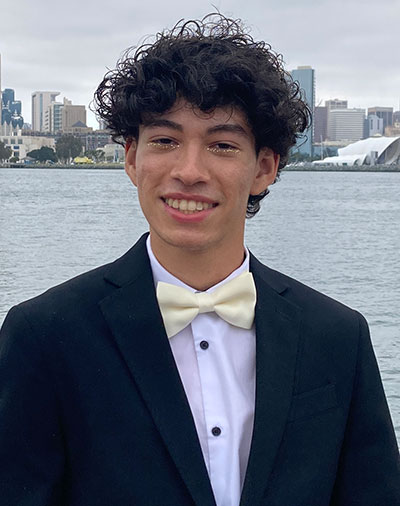
Stephen G. Bowersox Memorial Scholarship
Donors: Jim & Donna Bowersox
Victor Albañez
Victor Albañez will be studying psychology at Stanford University in the fall. He plans to continue his work as a mental health advocate and become a clinical psychologist to serve underrepresented and LGBTQ+ communities.
When I came out to my mom, her first reaction was denial, insisting I was too young to make decisions about my “lifestyle”. She took me to see a therapist, who with a monotone voice commenced the session asking me to interpret images while I sobbed uncontrollably, feeling anxious, attacked, and increasingly disconnected to her, which all made me question the value of psychology.
A couple years later, for my Human Geography research paper, I chose to investigate why suicide rates were higher amongst LGBTQ+ people. Never imagining how big the gap was: A study conducted in Boston found 17% of the sexual-minority adolescents reporting a suicide attempt, compared to only 2.43% of heterosexual adolescents.
I immediately began looking into ways I could address the issue, encountering a renewed interest in psychology, treating mental illnesses, and better understanding mental health. In my own community, I’ve prioritized ways to help fill in the lack of knowledge there is throughout the mental health field. By founding the Mental Health Club at Southwest High School, I was able to begin the arduous process of dismantling mental health stigmas, which are increasingly prominent in low-income latino communities like my own. Starting in 2020, we managed to reach an impact even while being restricted to a virtual setting. Over the pandemic and to this day, the team and I have conducted series of presentations that are relevant to current events: from self-care to Suicide Prevention. In addition, we worked with the Breaking Down Barriers team at Jewish Family Service (JFS) San Diego to bring a community lens to several mental health topics, including discussing Self Care During COVID-19, Mental Health Stigmas, and Stress Management with club members, students that joined in interest to the topic, and the JFS team. Lately, we’ve been prioritizing the success of the Mental Health Club despite myself and the rest of the officers not being present next year, and the years that follow, as we aspire that our club continue bringing its benefits to our community.
By viewing the field of psychology through the lens of a queer Chicano individual, I have realized the power there is in receiving help from someone who shares a similar background or identity. As a queer individual, having someone you can trust with your identity, especially before being out to the rest of the world can make a difference between life or death. As a Chicano individual, being able to comfortably portray your queerness specially within your family is overwhelming. Dealing with queerness and internalized homophobia is a process that requires community. And with that, I know now that the world is not a place to be independent rather a place to surround yourself with community and love.
Excitement kicks in as I aspire to be the gay, Chicano psychologist I didn’t have as a 13 year old, to help others who can be easily misunderstood navigate their mental health. During the next five years of my life I plan on securing my spot at a 4-year university and graduating debt-free. I am aware of the countless research, internship, and networking opportunities that will become available during my years in college and graduate school, that I plan on using to strengthen my passions. And eventually, in 20 years I’ll picture myself looking down at a plated name tag with the words “Dr. Albanez” shining back at me. I’ll be Frequenting the hospital I will be lucky to call my workplace, all while continuing to foster a community of acceptance by continuing to dismantle mental health stigmas that will hopefully be less prominent. I aspire to be able to give back to my community, including by making mental health resources widespread and known, and considering the issues of living in a low-income community I am well aware of. Although I am uncertain of where the future will take me, I can’t imagine it without being involved in my own community, as well as the many low-income minority communities across the United States and globally.
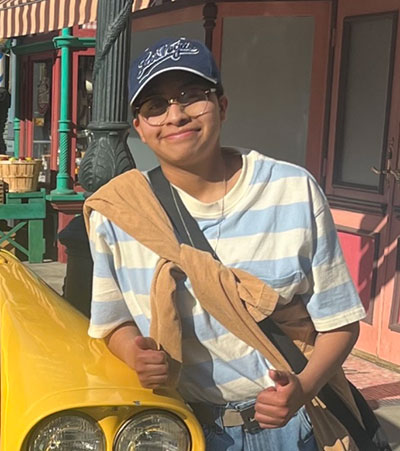
Raytheon RAYPRIDE STEM Scholarship
Donor: Raytheon RAYPRIDE
Susanne Garcia
My name is Susanne Cervantes and I’m part of the Class of 2022 at Gompers Preparatory Academy. I have lived in San Diego my entire life, and I have always dreamed of being able to go to college. I will be attending Cal Poly San Luis Obispo in the fall, and I can’t wait to pursue a career in Computer Engineering and to be able to come back and give back to my community.
During my time at the program, I’d help the instructor set up the classroom for the day’s lab activities and I’d assist the students during the labs. The students ranged from 2nd to 8th graders. To none of my surprise, they asked many questions with curiosity. While I was able to answer some of their questions, they had the answers to almost every question I asked them. They gave me random facts about trains, sharks, chemical reactions, and Newton’s Laws of Motion. However, what they didn’t know was what they could do with all of that information. We had a marine biologist come in to give a presentation about whales, the students were shocked when they found out this was a real job. A similar moment occurred when an engineer who worked for NASA came in. It was exciting and heartwarming to hear many of the girls say they wanted to be biologists and engineers when they grew up.
I had one student, who was autistic, his name was Andres, I spent the most time with him as he needed more assistance. EIS was right across from the trolley tracks, and every lunch, as soon as the trolley ran through, he was fascinated by the bell that rang to warn the cars. He gave me so many facts about the different types of bells, and why they were switched, he was completely in awe, and together, we researched more about trolley station bells. We became very close and I remember on the last day of camp, the program coordinator said Andres’s mom wanted to meet me, and she thanked me and said that Andres had really been getting out of his shell ever since the program began, and that she had heard he’d been telling me jokes, something he never did. She then said that he was coming home and telling her about all the things he learned, and that he wanted to be a scientist when he grew up. To me, that made all of the difference in the world, those words gave meaning to my entire summer.
I’d like to think and hope that I made a small difference in Andres’s life, and I hope that he grows up to be an outstanding scientist who finds solutions. This program made me see how much potential there is for the future of our world, these students will come to be artists, scientists, teachers, engineers, these students will hopefully make the world a better place.
Volunteering at this program was truly a fun experience, and I hope it was just as inspiring for these students as it was for me. Moving forward, while I’m sure of what it is that I want to pursue, that being a career in engineering, I’m even more sure of what I want to do for others. The Elementary Institute of Science taught me that it’s important that everyone has an equal opportunity. It’s also important to me to try and give back to my community as much as possible, and hopefully I can continue to contribute what I can towards the mission EIS has set out to accomplish. The most important thing I learned throughout all of my experiences is that it doesn’t matter who you are, what you are, your financial background, or where you come from, it matters what you create and what you do for others to make the world a better place.
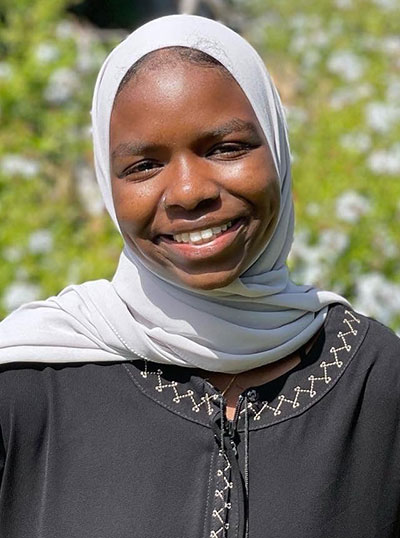
Kendall Family Memorial Scholarship
Donors: Terrie Vorono & Lonnie Brunini
Noseiba Suleiman
I am born in Nyala Sudan, but at the age of 2 I moved to Kenya because of all the war happening. Then I moved from Kenya to the USA because of the lack of opportunities in Kenya. I am a graduating at Crawford High School. I am the president of Diamonds in the Rough. I want to purse a career in the medical field as a Pediatrician. I will be majoring in General Biology at UCSD fall 2022.
I joined Diamonds in the Rough my freshman year because it encourages African-Americans to stand out and learn to advocate for themselves. I emailed the club advisor and became President. I wanted to help him keep the club going throughout the pandemic. Many of our members are from other countries, and I wanted to help members learn more about their culture and where they came from.
During Black History Month, I helped find people to perform and choreograph cultural dances in the school gym. Due to Covid-19, we weren’t able to perform, so I pivoted by making graphics about Black figures that aren’t that well known and educating my peers about it by posting them on our social media page.
Everyone deserves to be a part of a community that makes them feel welcomed and comfortable, so in addition to Diamonds, I joined No Place 4 Hate my junior year. Everything was online, so as Co-President I made Google forms and asked staff to share the pledge with their students. For our first activity, we created an Instagram page called “Humans of Crawford,” similar to “Humans of New York.” Through this Instagram page, students got the chance to tell their stories and empathize with each other. I made Google slides presentations about bias’ in our everyday lives and COVID-19’s negative effect on Asian-Americans, which teachers at my school presented to all their students. Making these presentations made me more self-aware of my own bias and I got the chance to educate myself more on how COVID-19 affects everyone in our community.
Although I was experiencing the same thing that my peers were going through during the pandemic, I was proud of creating slides and programs that helped others be able to process what they are going through. To ensure that both clubs will carry on, I have made it a mission to make sure to have underclassmen take over these clubs before I graduate. Finally, I learned to stand up for people when they cannot stand up for themselves and will continue to do that in college.
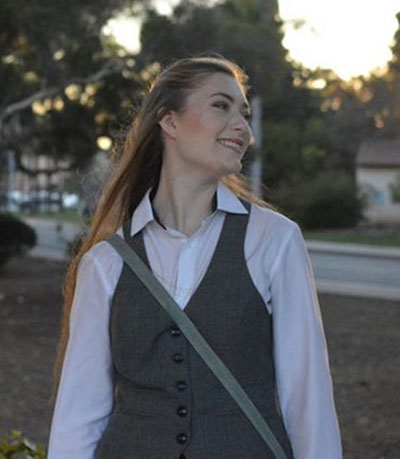
Qualcomm Merit/STEM Scholarship
Donors: Qualcomm eQuality LGBTQ Employee Network & Jim Ziegler
Anna Mraovic
Anna Mraovic (she/her) is a graduating senior at Mission Vista High School for the Class of 2022. She plans to attend the University of California Los Angeles as a Molecular, Cell, and Developmental Biology major on the pre-med track, and she also hopes to pursue a minor in either literature or classical civilizations. She is the co-founder and president of her school’s chapter of the International Youth Neuroscience Association, a pursuit she hopes to continue into her undergraduate studies. In addition to her passions for STEM, Ania is an artist and enjoys expressing herself through dance, writing, and drawing.
This experience sparked a realization about the importance of the work I want to do in the future. My goals involve becoming a neurosurgeon, which I have been exploring through the neuroscience club I founded. I was always interested in neurodegenerative diseases and how biotechnology and surgery can be used to improve the lives of those affected, so I want to focus on these issues in my career. Neurodegenerative diseases hinder people’s ability to consciously control their body, and movement is such an integral aspect of experiencing the world because of the opportunity it provides to express oneself. The freedom of self-expression is dear to me as a queer individual, and it is an integral aspect of the queer community, which is why I am passionate about helping people who have lost that freedom to gain it back. Being a neurosurgeon would provide me with the tools and opportunity to transform this passion into a reality. I would be able to participate in clinical trials, collaborate with biomedical engineers, and conduct research that would help recognize these diseases in early stages before permanent damage is done as well as help those that have lost movement to regain it through prostheses and implants.
Selflessness and a drive to help others and bring them up is a valuable trait in people, but I see it as a necessity for anyone in the medical field. It is very important to me that people can feel represented and heard by the medical professionals around them, which is why I strive to be that medical professional.

Qualcomm Merit/STEM Scholarship
Donor: Qualcomm eQuality LGBTQ Employee Network
Shelby Warren
Shelby Warren grew up in Atascadero, California. She recently finished her third year of medical school at UC San Diego School of Medicine. She is very interested in issues of health care insurance access, and is part of a dual-degree training program that focuses on advancing health equity. Shelby is excited to apply to residency in psychiatry upon completion of medical school.
Now nearly finished with medical school, I’ve helped bring basic medical care to more uninsured and underinsured patients than I can keep track of. Basic access to health care is a crucial problem in this country, with many lives senselessly lost due to policies which exclude rather than include. I am driven to address this as a core focus of my medical career. My goal? To contribute toward the successful and responsible implementation of a universally accessible, comprehensive, quality health care financing system in the United States.
Currently, I am a third-year medical student at UC San Diego School of Medicine. I am part of a small cohort of 10 motivated and compassionate student-leaders as part of the PRIME-Health Equity track. This is an amazing dual-degree program that supports medical students who are vested in issues of health equity. Built into the track is an additional year to allow students to pursue a master’s degree in whichever field most complements their vision for advancing health equity. As for me, I am passionate about the issue of equitable health insurance access due to my early life experiences growing up in a low-income family.
I was raised by a blue collar, single dad who worked as a handy man and went more than two decades unable to afford nor qualify for health insurance. Only recently, due to relaxations in the Affordable Care Act during the pandemic, did he become able to afford health insurance premiums. Throughout my premedical studies and transition into medical school, I watched my dad needlessly suffer with uncontrolled chronic diseases that would have been manageable with regular medical care. I eventually helped him establish care a small free clinic within our county. However, due to the unmet needs of the uninsured in the community, my dad experienced long wait times and could not access the same quality of care of the insured.
The experience of watching my only parent unable to access medical care, all while working toward becoming a doctor, was deeply unsettling. My father’s struggle ignited my passion for health equity and has driven me to spend the last several years learning about and advocating for systemic change in our health care financing system. I truly believe that health care is not patient centered when it is inaccessible to millions. The suffering caused is immense and preventable.
I am committed to the issue of health insurance access. As a result, I have dedicated time to addressing this issue through multiple avenues. Prior to beginning medical school, I spent two years working as a Spanish medical interpreter in a free community clinic for the uninsured. In 2017, I became involved in Students for a National Health Program (SNaHP), the largest student advocacy organization for universal single payer health care.
I have made these service interests a priority during my medical education. As soon as I started medical school, I became involved with UC San Diego’s Student Run Free Clinic Project, which serves a huge community of uninsured patients at four locations throughout San Diego. I have had the privilege of seeing patients in both the capacity of primary care and psychiatry care appointments under the supervision of fantastic physicians. Specifically, I have served over the past year as a Continuity Clinic Manager and a Psychiatry Clinic Co-Manager. Both leadership positions have come with the responsibility of managing the primary and psychiatry care of multiple patients longitudinally, which has been an enjoyable yet humbling experience. I have taken on many other duties, such as directly delivering healthy food, medications, and paperwork to the homes of patients during the pandemic.
I have also maintained active leadership in Students for a National Health Program. My most current position in SNaHP has been as a Coalition Building Representative on the national leadership board. I was attracted to this new position this year because it was built to cultivate mutually beneficial partnerships between our organization and other organizations dedicated to key health care equity issues. For example, over the past several months I have been reaching out to groups such as the Student National Medical Association and World Professional Association of Transgender Health to identify potential opportunities for collaboration, such as at the upcoming SNaHP National Leadership Summit. This work has been so rewarding. I believe strongly that the issue of health insurance justice cannot be looked at without considering the way in which other factors such as race, gender, sexual orientation, and disability intersect to produce social disparity.
Humanism is one of my core values: the connection it brings adds meaning to my life. For this reason, I have centered humanism in my educational, professional, and community service goals. My training in the field of health equity is often bittersweet, however. I regularly reflect on what it means to be privileged enough to study health inequity while simultaneously caring for patients who deal with tremendous inequities every day.
To make tangible, system wide change during my career, I am pursuing training at Johns Hopkins during my PRIME master’s year to obtain a health care business degree. My goal is to create a framework for understanding health care finance equity. I will use my training to advocate responsibly for a health care system that is compassionate and patient centered. At UC San Diego and certainly beyond, I will remain committed to activities that uplift the values of compassion, empathy, respect, and health care excellence for all.
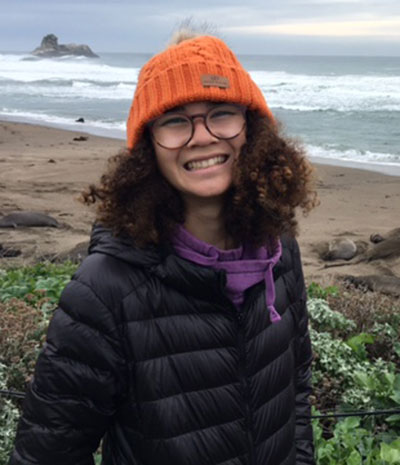
M. Lynne Austin Memorial Scholarship
Donors: Ray & Jan Aller
Madeline Mack
Madeline Mack (she/her) is a writer, adventurer, and kind-hearted human being passionate about protecting the earth and creating a more loving world. She is a graduating senior at Sage Creek High School, where she is Editor-in-Chief of the student newspaper, The Sage. She will be attending Stanford University in the fall to pursue a degree in English/Political Science.
Ahmaud Arbery, George Floyd, Breonna Taylor. Their murders rattled me to my core. People around the world protested the injustice but I felt powerless. I knew I needed to do something.
One evening, I sat looking up at my bookshelf. It was filled with the stories that shaped me: Jacqueline Woodson’s novels where I found my sense of self, the memoirs of Sonia Sotomayor and Patrisse Cullors that revealed to me the complexities of others’ struggles and victories. These books exposed me to the realities of the world and I was better because of it. At that moment, I knew what I must do.
“Wanting to unpack all of your feelings about the problems of injustice shaping our world right now?” I wrote. “I am creating a book club for teenagers and I would love it if you would join. We will read books by underrepresented authors covering topics that compel us to broaden our perspectives. I posted my message to social media and my peers responded.
We read The Hate U Give, meeting on Zoom weekly to discuss the issues of racism and police brutality. We spoke of our own experiences and how we could actively counteract these problems. For a year we dove into voting rights, gun reform, and other topics saturating our society with division. We challenged our own preconceived ideas, were exposed to the experiences of our fellow humans, and developed plans to make the world a more just place.
My phone would fill with messages of gratitude. “These are such important conversations to be had,” one member wrote. “Thank you for creating this.” The feelings of appreciation were mutual. Their participation allowed me to constructively approach these issues and gave me hope for our generation. I was inspired to put together a comic book that told the story of the club’s impact. I submitted the book to the New York Times Coming of Age in 2020 Multimedia Contest and it was selected to be published. I was ecstatic; the story of our little community book club would be shared in a publication with worldwide readership. I was recently notified that it will be featured again in an upcoming publication by the New York Times through Norton publishing in the Fall of 2022.
One of my greatest gifts is my writing and my ability to empower others through it. I have always loved to write; I would scribble letters onto paper before I even knew how to arrange those shapes into words. Sophomore year I transferred schools and enrolled in journalism class. This is where I discovered the power of my skill. I studied the art of reporting, searching for important topics, such as the problem of plastic waste, that lacked coverage on our campus. I learned to craft questions that would provoke compelling answers, and I developed relationships of trust with my sources. Once I had all my material, I would write away.
I was beginning to believe in my journalistic skills when the Creating a Respectful and Open World for Natural Hair (CROWN) Act was passed in California. I used the newly established legislation as a chance to dive into how Black women on our campus felt about their natural hair. Writing the story was empowering as I connected with fellow Black women and discussed a topic that affected our everyday lives yet was rarely talked about at school. I was later notified that my piece had won a Best of SNO (a competitive national scholastic journalism site) award. I was so proud to know that I was shining light on an underrepresented demographic at my school, uplifting the stories of those who look like me.
My love for journalism and writing was solidified. In 2021, I was one of six students in the region to be accepted into The San Diego Union-Tribune Community Journalism Scholars Program where I had the privilege of learning the intricacies of professional reporting. I took the opportunity to highlight the San Diego LGBTQ+ and Black communities in the county-wide paper. At the end of the program, I was selected as the Exceptional Performance Award recipient for my commitment to pursuing challenging stories and my consistent support of my colleagues.
I have and will continue to develop my skill of writing into a tool to help others be seen, in hopes of making the world a more understanding and just place.
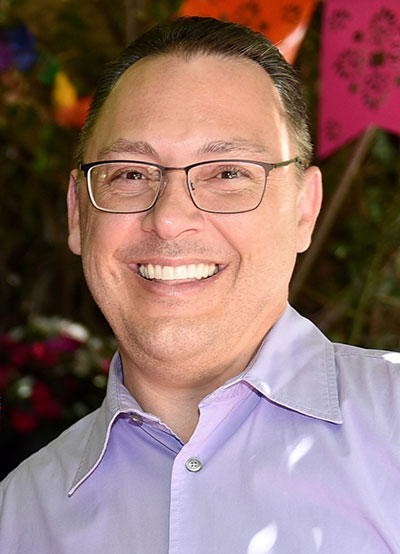
Daniel J. Ferbal Memorial Scholarship
Donors: Rob Benzon/Dan Ferbal Foundation
Jason Cuneo
Jason Cuneo currently serves as the Senior Services Case Manager at The San Diego LGBT Community Center. Prior to this role, Jason worked as a Medical Case Manager with the Southern Arizona AIDS Foundation. Jason received a BA in Dramatic Arts and Health Education from the University of Arizona. Originally from Tucson, Arizona, Jason has called San Diego home since graduating from the University of Arizona. Jason and his husband of 25 years met in San Diego and they are the proud parents of 19-year-old twins, who were adopted at birth from San Diego County. Jason developed a strong devotion for the nonprofit sector, having worked for and volunteered with various community organizations throughout California and Arizona during the course of his career. He is excited to have the opportunity to continue his education through the Keck School of Medicine, Master of Public Health Program.
I currently serve as the Senior Services Case Manager at The San Diego LGBT Community Center. Within this role, I provide case management services, including housing case management support, supervise and facilitate group activities and workshops and collaborate with community partners to provide referrals to a diverse LGBT and HIV positive senior community. I coordinate senior programs to address HIV testing, social activities, advocacy, health care education, enrollment in support services and life skills training. In addition to these responsibilities, I help oversee the implementation of a research project leveraging advancements in technology to develop a local community of persons capable of supporting older adults living with HIV with the goal of enhancing their wellbeing, social engagement, and improving knowledge of and access to support services. Prior to this position, I worked for the Southern Arizona AIDS Foundation as a Medical Case Manager.
Throughout my career, I have observed and experienced a critical lack of support and access to resources among communities of color and LGBTQ+ communities, which face significant disparities in healthcare access, education, and dispensation at every level and in every area of specialization. These health disparities have long-lasting effects on the individual and the community, as evidenced by an increase in mental health illness, discrimination, trauma, experiences of violence and victimization, denial of basic human rights, societal stigma, and poor health outcomes.
My admission to The University of Southern California, Master of Public Health program would offer me access to a cutting-edge, world class program that would empower me and provide me with the tools, resources, skills, and opportunities for hands-on, engaging, impactful and relevant research and applications for the ever-evolving field of public health. Which is directly aligned with my personal mission to reform health disparities and provide culturally competent access to care and services.
As a member of the LGBTQ+ community and as an individual born into a family rich in culture and Mexican tradition, I often find myself at the intersection of race, culture, sexuality, and economic disadvantage. This complex background has informed my experiences and as a result, I have witnessed the impact public health policies and strategies have on health outcomes. My current and past experiences, coupled with my academic background make me uniquely prepared to lend an invaluable, positive contribution to my community.
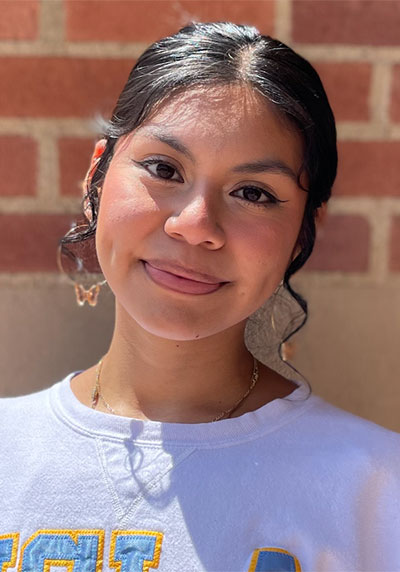
Gary A. Marcus Scholarship for the Fine and Applied Arts
Donor: Gary Marcus
Iris Kimberly Cantoran
Kimberly Cantoran is a first year music performance major at the University of California, Los Angeles. Kimberly is involved in Grupo Folklórico de UCLA (GFU), a student-led ballet folklorico group. She has recently been elected Co-Recruitment and Retention Manager for the upcoming 2022-23 academic year for GFU. She also takes part in Latinas Guiding Latinas de UCLA (LGL) as a mentor to elementary school students in the Los Angeles area. With each step of her academic and professional career, Kimberly carries empathy and compassion to uplift others, and create safe spaces for young adults.
I have always gone out of my way to help others feel seen, heard, and included. Acting with compassion and empathy was intuitive for me, and I quickly realized that other people appreciated and benefited from simple acts of kindness. My actions were never accompanied by an expectation of some form of reimbursement. After all, I believe everyone desires to be recognized, understood, and accepted for who they are. I believe people thrive when they are surrounded by people that provide this kind of nurturing environment. I make the effort to align my personal, academic, and professional goals with my values of compassion and empathy to empower others.
My memories of reaching out a helping hand go all the way back to my early childhood. In preschool, there was a girl in my class who was a bit of an outcast. Of course, she was only an outcast because all the other students decided she was. But there wasn’t anything about her that made her any less than us. She was different. Her brown curly hair, loud interjections, and enthusiasm was definitely something that made her stand out. But even children recognize when they are outcasted and neglected. She receded into her shell, and she struggled to make friends. I don’t remember exactly how I started to befriend her, but I remember she loved to play in the colorful floor tunnels during recess breaks. That was my way of finding a common middle ground to reach her. We would play together in the tunnels, pretending they were spaceships or trains taking us to lands of fluffy clouds and candy castles far, far away. As I began inviting her to other activities in the classroom, more and more students realized she was a joyful, loving person. We expanded our playgroup with more friends throughout the year. I moved schools shortly after being promoted from preschool, but I will always remember her toothy grin and curls. Named after a gemstone, Esmeralda taught me to be imaginatively joyous on the black asphalt of Alvin Dunn Elementary school.
I discovered how to further put my strengths to use in high school by involving myself in leadership in my school’s music program. I’ve kept compassion and empathy at the core of my service. I worked with students in groups and one-on-one instruction, teaching musical and academic skills. Holding titles such as Mentor, Section leader and Board Executive of the CORE Academy mentoring program of my school, I cultivated my values by putting them into practice each day to create safe environments that encourage youth to pursue their interests, and to provide a place of belonging for them. There is one moment burned into my memory of my high school music director telling me, “it’s not the music, it’s you.” In the moment, I had somewhat of a sense of what he meant, but I wasn’t one hundred percent sure. I tried to dismiss his honest appreciation for flattery, but I am glad I did not succeed at this. Now I think back at his comment and realize that he meant to compliment my personal traits and values: my compassion, my generosity, and my desire to help people feel inspired. His comment had inspired me to recognize my strengths and continue to use them for the betterment of the communities around me.
As I’ve begun pursuing a higher education at UCLA, I’ve continued to hold my values close. Currently, I participate in Grupo Folklórico de UCLA (GFU) and Latinas Guiding Latinas (LGL) on campus. I realized my goal of joining a folklórico group here in college, and quickly discovered that the group was more than an extracurricular for many students. It is a home away from home that connects us with our culture, and provides a smaller community to be a part of within the large university. Like my high school music program, I plan to give back to this group overtime by running for GFU’s Recruitment and Retention Manager position, which will allow me to strengthen the community by inviting new members and organizing social events for the group. This is especially important because as senior members graduate, it is up to new underclassmen to continue the spirit and functioning of the group. The other student organization that I have recently joined, Latinas Guiding Latinas, is a mentorship program that pairs Latina students at UCLA with elementary, middle, and high school students in the Los Angeles area. As a new member, I am still learning to navigate the tasks and responsibilities of being a college mentor, but am ecstatic to say that I am beginning to participate in visits to Robert F. Kennedy Elementary School and plan to increase my participation in the organization over the course of my time at UCLA.
In the end, I want to see people bloom into their best selves. I want to see adolescents believe in themselves and grow into the people they dream of becoming. It is an honor to help nurture the personal growth in others, especially children and teens. I believe this kind of human connection and genuineness is a phenomenal experience. It’s transformative, and has the potential to empower people. I hope to pursue a career that builds on my experiences and passion for mentoring. I plan on exploring career paths in social work, non-profits, and related fields. I will continue to foster my skills in mentorship and service, and my values of empathy and compassion to empower others to live authentic, healthy, and fulfilling lives to better the world around me.
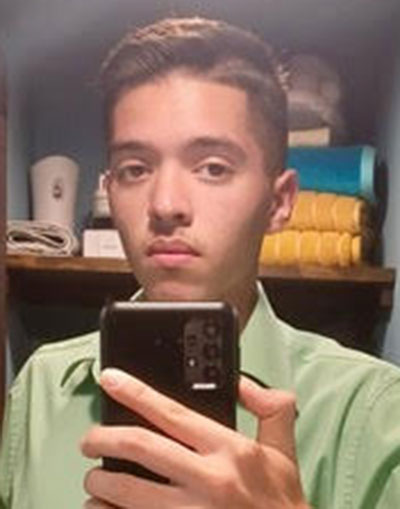
Bill Hanson Community College Scholarship
Donor: Bill Hanson
Isai Coronel
Isai Coronel (he/him/his) is graduating from East Village Middle College High School and plans to attend San Diego City College with an emphasis in finance. Isai has shared two of his passions: he wrote in his essay not only about volunteering with community clean-ups to reduce the impact of pollution, but also the need for individuals to become financially literate. He hopes this will have a “ripple effect” in people’s lives to help communities flourish.
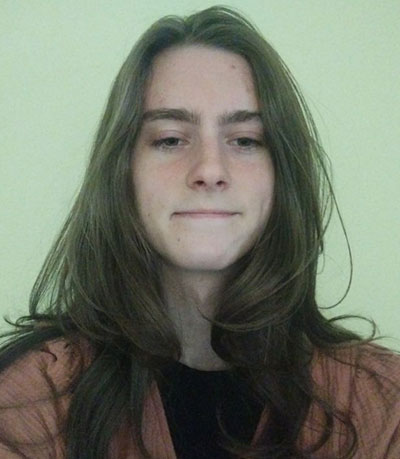
Bill Hanson Community College Scholarship
Donor: Bill Hanson
Jae Engleman
Jae, 17 year old senior at SD Metropolitan Career and Tech. Academic interests: Computer Science, Archival Science. Other interests – Social Media, Anime, Manga, Video Games, Sports. Pronouns:: She/Her
Pertinently, of utmost importance is the need to be a well-informed individual. To be involved in current, pressing issues that the queer community faces, it is crucial that I am not only informed, but thinking about current events and forming conclusions that can be applied to the real world. If I feel confident in this regard, I can apply my knowledge for a positive impact to my community.
One example of this can be seen in my active participation within academic settings. While enthusiastic voices pertaining to relevant discussions held in the public education system are few, those coming from a queer [especially transgender] perspective are even fewer. Between the small number of out of the closet transgender individuals and the duress that can come from discussing or even debating your very identity, it is unsurprising that this demographic is underrepresented in the sphere of academic discussion. As a proud and publicly identifying transgender individual, I strive to provide a sorely needed perspective in and out of class. Through addressing common misinformation frequently verbalized in these discussions, providing concise and practical solutions to complex issues, and understanding that others might not have the same access to information or time to contemplate such a heavy topic, I am confident that my voice provides a significant positive impact in many regards, but most significantly to transgender individuals in my community.
The clearest instance of this comes from a fruitful discussion held in the weekly Business class (through which I heard of PFLAG) relating to transgender issues in the broader context of intersectionality both in and out of the workplace. While many points were made that come from places of misinformation that can end up harming the transgender community, my personal relationships with classmates made me confident that their intentions were not discriminatory. I took a lead role in this discussion, guiding the conversation to pressing issues such as transgender suicide rates and the role that acceptance and support plays in them, as well as citing common falsities frequently stated in regards to issues such as transgender participation in athletics.
Outside of an academic context, my will to support the queer community is equally strong. Casual social settings, especially those spent conversing with a single individual, are one of the main ways that I am able to provide a voice for marginalized people. While talking to my peers, it is not uncommon to discuss various aspects of myself and others involved in the conversation. This certainly includes my identity and life as a transgender woman. This personal perspective provides another layer of depth to a person’s understanding and acceptance of the queer community. While demographic statistics and information on current events are effective at encouraging inclusivity and acceptance, having personal relationships with queer people affected by these issues provides a more direct and emotional connection.
Further within the social sphere, social media is ever-increasingly central to communication. Many individuals who feel marginalized by the discrimination they face find a supportive community through various forms of social media. I am personally most active on Twitter, where I have met and befriended many queer individuals. For people who have difficulty finding genuine acceptance in their lives, these connections are vital. I am grateful to be able to provide a supportive and accepting environment to people unable to find it elsewhere, and I recognize the magnitude to which this directly helps people. Additionally, as someone with a relatively large platform (over 80,000 followers on Twitter), I feel it is my responsibility to reach people with my influence. I have made several statements in support of the queer community with my platform, including personal accounts from myself as well as statistics and logical arguments to defend the marginalized people I share an identity with. While the vast majority of comments are supportive, there are many that come from a place of hate. It is important to highlight the ways in which non-accepting individuals directly harm marginalized communities, and the voice of a relatively popular account consistently supporting these ideals helps to reduce the sense of isolation and ostracism that members of marginalized communities face.
I try to provide a positive impact to the queer community in as many facets of my life as possible, and I am satisfied with the extent to which I have been able to achieve this thus far. However, this does not mean I am unable to strengthen my positive impact. I am constantly striving to improve my ability to process information and deliver it to others in a concise manner, and the extent of my impact could be furthered. I hope to become more involved in the political process in the future. I am nearly of voting age, an exciting prospect in regards to being able to support inclusive legislation. I am also interested in participating in local politics to more directly support the members of my community. There is always more to do, and there is always work that must be done to get there. I am excited to continue my progression as a positive impact on my community.
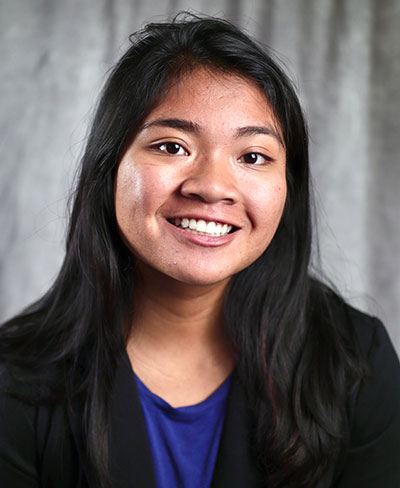
Personal Achievement Scholarship
Donor: Anonymous
Jessa Ponce
Jessa Ponce (she/her) is an undergraduate junior at the University of California San Diego. From her personal story with an autoimmune disease called Alopecia Areata, to tutoring K-12 students every week, her life’s purpose is to project an emphasis on confidence. Through public speaking opportunities like in her TED talk, “Finding Security from Our Insecurities,” Jessa shares her hair loss journey and hopes to teach others how to transform into a bolder version of themselves. She wants to further learn and research open self-acceptance and confidence.
Though reflecting on this sometime after my 16th birthday, I remember looking back at some photos with friends. I realized my hair should not define me or my confidence. The only opinion that matters about myself was on my own character and personality. Progressively accepting myself and support from those who uplifted me, I became content with who I was. This boosted my self-esteem, bold enough to the point wherein April 2017 I decided to shave my head bald. The physical feeling yes, was scary, but the emotional feeling, taking control of what was eating away at me for so long, felt so good.
Fast forward to college, I still get small bald patches on the side of my head, but I gained newfound knowledge of how to treat myself and others kindly when dealing with insecurities. From losing all my hair in high school, to gaining it back in college, I found a new appreciation for teaching people how to be confident.
I have found new gratification for sharing my story, expressing to my community that confidence can be found, despite our biggest insecurities. I used to shy away from public speaking, but I mustered up the courage this year to share this essential message. A way I have made a positive difference in my community is by giving a TEDTALK speech at UCSD on my hair loss. Over zoom, with about 70 attendants in the audience, I shared my hair loss story and advice on how to manage our insecurities day-to-day. Moreover, I gave a speech at SDSU for the “Dance Marathon,” an eighteen-hour-long event where they raised money for Rady’s children’s hospital. I was invited to share my story about my ongoing treatment of Alopecia Areata at Rady’s. Being vulnerable, sharing my story in front of a whole crowd, made an impact on my community. I wanted my audience, acquaintances, and family around to realize being vulnerable can be beneficial rather than harmful. Accepting ourselves, allowing inevitable change, is a powerful message that I exuded and made sure was present in my speeches. Moreover, it felt good to be a part of the “Dance Marathon” event which raised over $400 thousand in donations, to the Rady’s Children’s hospital, where I received and continue to get my hair loss treatment. I full-heartedly appreciate those in my community who uplifted my own self-esteem. This is why giving back to the community that supported me is personally important. This appreciation holds true not only for my community but within my family as well. My public speaking experience with confidence has helped my dad gain enough confidence to on-go recovery, from his recent stroke as of 2019.
I will change the world for the better by consistently encouraging people to be more confident and accepting. I find it a point to inspire people to become better versions of themselves, despite adverse challenges. By sharing the truest, rawest form of myself I spark a new perspective of joy and gratification, for those who may watch my speeches. Moreover, I will continue to serve everyone I can by helping them learn. From becoming an instructional assistant in my 2nd year of college for a psychology class to continuing my job as a weekly K-12 tutor, I find it essential to not only teach people content but to teach people how to be confident. I find it important to build up the confidence to uplift those with confidence issues holding themselves back from their full potential. My future goals as a psychology major at UCSD are finding psychology research opportunities where I could explore the questions of how self-esteem and confidence play a role, especially within education involving testing or learning. I want everyone to know that they do not have to hide from what they think is holding them back, instead, they can stand up and be fearless about what is to come. I find it important to promote confidence and motivate positive self-talk. This can also be applied to anyone. Identifying as a bisexual, second-generation, Alopecia, there are unique aspects to myself that strive me to be better. These characteristics that define me motivate me to spark others’ sense of self-development. I hope to deeper explore the impact of confidence, continuing my higher education at UCSD.
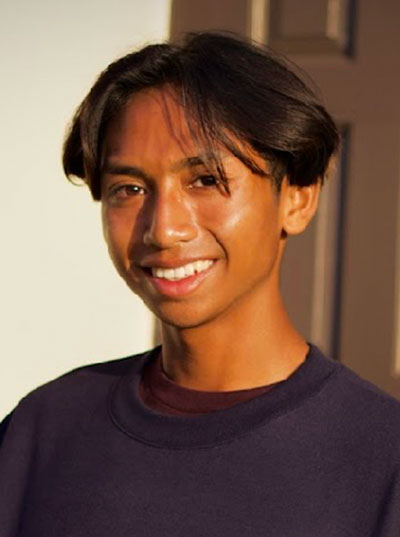
Personal Achievement Scholarship
Donor: Anonymous
Joseph-Blue Sun
My name is Joseph-Blue Sun, I am an 18 year old senior from Crawford High School. In the fall I plan to attend the University of California, Santa Cruz majoring in Marine Biology. This milestone is so amazing to me I am the first in my family to attend college, I am low-income and under-resourced, and I am from an ethnic community (Laos and Cambodian) where only 10% of high school graduates go on to a college/university and graduate; this scholarship helps increase that statistic.
As a first-generation student, growing up, I had no one to advise me on the college application process. My parent’s highest education was a high-school degree and they both experienced financial hardship. I experienced domestic abuse, a broken household, custody disagreements, and homelessness. Navigating through life in general, not just the college application process, would be tough but Urbanlife assisted me through this process both directly and indirectly. I feel like without them, I would not be the person I am today. I am grateful for programs like Urbanlife because I would also not have the necessities and mindset to prepare me for my future. This program took me away from the wrong friends, crime, and drugs and truly changed my life.
City Heights is a diverse, low-income neighborhood known for its ethnic diversity. This community houses immigrants and refugees who lack resources in education, food, and affordable housing. City Heights Runners is part of a non-profit organization called UrbanLife. This program helps elementary, middle, and high school students from the community become successful through spiritual, professional, academic, and physical development.
When I started running on my school’s Cross Country team, I fell in love with the team environment and the sport. I decided to start coaching because I wanted to share this same experience with people younger than me. I also saw how students from hardship obtained success through running. An example would be my captain, who received a running scholarship. I wanted this to be the case with other City Heights students so they too can obtain success through running.
I started the middle school coaching program during my sophomore year and I was able to help train 8th-grade students at a local middle school. While I coached them physically, I was also able to coach them mentally. I taught them how to push through pain, to have a positive mindset, and that they can do whatever they put their mind to. Many of these students did not know how to be mentally tough and push through the pain. Also, many of these students were not able to run for ten minutes, but through practice, they were able to run a three-mile race.
I was able to impact my community by inspiring middle school students to fall in love with what I fell in love with. I coached four kids named Martin, Kimmy, Christopher, and Larry. All these students continued running into high school and I feel as if I were a big part of them doing that. This impacts the community because these same students are able to pass down the idea of running to younger students. By being on the team and running, they continue to fulfill our team’s “Culture of Excellence.” It’s my hope that this culture of excellence will carry on with these students throughout their lives.
Many alumni come back to donate, volunteer, and contribute to Urbanlife when they become able to. The majority POC, immigrant, and first-generation population is truly a hidden gem in the big city of San Diego. Because the students here lack resources, seeing beneficial programs that change kids’ lives has inspired me to want to contribute. I also really enjoy the presence of children. I often form close bonds with students I coach and younger teammates that I lead on my Cross Country team.
In my community, only 10% of the Lao and Khmer high school graduates from my area go on to a 4-year university. Since I am from both of these communities and in the top 5% of my class, I hope that I am able to inspire other students that come from the same background and be a role model for them. In addition, it is my hope that my success will help uplift the community by increasing the number of students that attend college. In college, I wish to inspire the upcoming generations to become involved in programs Urbanlife because they will truly change your life. I also want to contribute to Urbalife volunteering or donating because I will benefit from this program.
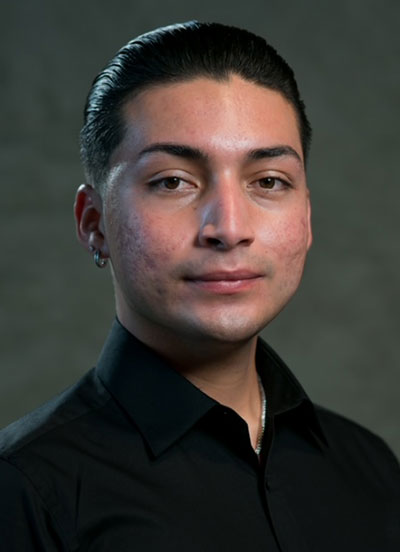
PFLAG SDC Merit Scholarship
Donor: PFLAG SDC Scholarship Fund
Derrick Herrera
I am a second-year student at San Diego State University, with an emphasis in Political Science and American Indian Studies. I have an overarching goal of attaining my Juris Doctorate. I have the overarching goal of becoming a Tribal Attorney. Being Indigenous from San Diego County, over the years I have gradually developed a passion to protect minorities and underserved communities. I love having the sense of duality in many places, to where that makes me who I am. The system has been unjust in the past and there are grey areas that can potentially be harmful, and this is what I strive to prevent. The dissonance and disregard should not be prolonged, for Indian country are more than real. It is alive and thriving.
Transitioning into “normal” academic spaces was a shock for many, where being safe and secluded was a valid state to be non-social. I would use this religiously, up until I was reminiscing of the involvement I had in my communities. A commonality amongst many, we serve many different roles; as I stand in communities with my Native American Culture, LGBTQ+ folk community, and pre-law society. They all mean so much to me, as they contribute to an array of attributes within myself. However, this past year I have had more emphasis on braiding roots with my Native community.
While at home, it was rather easy to find me interacting and strengthening my community. Many of the folks involved in things like Kumeyaay language class and cultural nights are people from my tribe. Yet, I needed to expand my spectrum into academia and not conform to its hierarchical stigma. I was tired of feeling like an outcast in this setting, where my culture was referenced as “the past” when I embody every aspect of it daily. It was lengthened with the fact that San Diego State has buildings of Missions; key contributors to my family’s assimilation. With that, I felt that the space wasn’t welcoming behind the façade that the “multicultural serving institute” has. Therefore, I went to seek an opportunity where I can emphasize my presence at a school that resonates on Kumeyaay land… my people’s land.
In the term of 2021, I was able to divulge into the Native Resource Center at San Diego State. It serves a great purpose for the emphasis that Native/Indigenous roots are still flourishing in the world and on campus. Since then, I serve as a Mentor and Programming Assistant in the center. Within my community, I find that pursuing secondary education is a discrepancy. Many folks just want to get past high school or find themselves struggling to stay in school after then. This is due to the lack of resources that schools provide for Native/Indian students, where they share a commonality of being outcasted in a setting. With these positions, I was able to break the rubric that academia has for students. Being a mentor was a little intimidating, yet I realized quickly the purpose that it served. The role of my mentorship was to welcome first-year Native/Indigenous students to SDSU. I would build familiarity, friendship, and help them through even the most tedious things. Taking this role has a great impact on the Native/Indigenous community, where they can see that students like them can be successful in academia that wasn’t structured for them. I had a few mentees, and I would meet up with them weekly, talking about anything! If they needed academic advice, a person to vent to, and even a shoulder to cry on, I was there. The feeling that many people experience in our community is loneliness, where many come from tight-knit communities, and the shock of seeing no one as you deter. This is where I would a mentor step in, not in a place of hierarchy where I am better; but as a friend. I create my relationships in a friendship, where we are friends and the space isn’t so formal.
One of the mentees I had was from the same nation as me. Where I found us being very close friends, building such a genuine and strong relationship. She emphasized to me early on that she was very intimidated with being in college, where people would question her identity and she was most of all demotivated by the fact that SDSU claims “the Aztecs”. To our community, it’s really harsh and bigoted. It’s a misrepresentation of Native/Indigenous people, and it’s a disrespectful portrayal of our Indigeneity.
With the commonality of that dislike amongst myself, my mentee, and many; I have participated in protests and made speeches against things that can be considered racist to my community. I want to protect my community, and invoke a sense of Native/Indigenous students wanting to come here rather than be scared of its bigoted rhetoric. Aside from the mascot, there has been worry about Native/Indigenous Visibility on campus. I have stepped into the role of being a direct advocate for my community. For example, I took part in a demonstration for California Native Day in the center of campus; making speeches to elaborate the significance of our culture, our presence, and what land SDSU resides on. As of recent controversy, SDSU has made their Offical Kumeyaay Land Acknowledgement optional. This was infuriating to the community, and myself as I am Kumeyaay. The Land Acknowledgment was given as a gift, and it seems like it is being disvalued. With the disruption, a few Native folks and I talked to the executive board and directors of a student coalition. We worked on a statement to put out, disapproving of the school’s actions. Currently, our community is working on actions to combat erasure, and keep indigenous visibility at a high.
I feel that I have been involved greatly within my tribal communities, but going on campus to find a similar community has made me feel at home. Giving back to the community I was raised by, and then giving back to similar communities induces a sense of wanting to pursue more. I already have an emphasis on Tribal Government/Politics, which gives me a sense of navigating relations within tribes. I feel that the steps I’ve taken to achieving visibility in academia, and comforting to the Native Community keep me motivated to serve Indian Country overall.
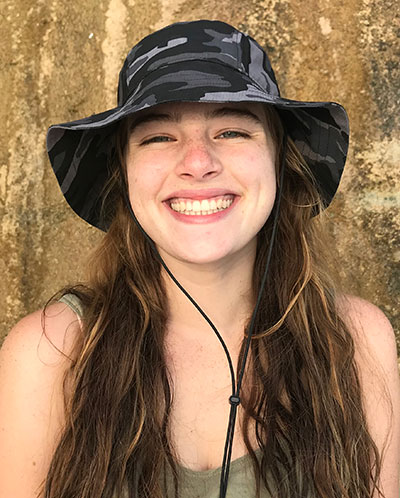
PFLAG SDC Merit Scholarship
Donors: Clive & Olivia Dorman
Rachel Leslie
Rachel Leslie is a rising senior at Ohio Wesleyan University majoring in mathematics and Spanish with a minor in computer science. After graduation, she plans on marrying her long-time girlfriend and beginning her career as a high school math teacher.
Going from San Diego to Delaware, Ohio, for college, I noticed a lot of changes. Some were great, like pierogies in the dining hall every week and the beautiful autumn leaves. Some were not so great, like the complete absence of sun for half the year. And still others were downright awful, namely the homophobia. Coming from a city with a vibrant LGBTQ+ community, I was shocked by some of the things I heard and saw. A boy refused to watch a movie because there was a gay character. I was told that I was more like a man since I was dating a woman. I have even dealt with my fair share of slurs. At first, all of this was extremely hurtful. How could people say things like that? Then last year, I figured it out. For many, I was the first gay person they’d met. Ever. Once I realized this, I knew these comments weren’t coming from a place of cruelty but instead a place of ignorance. They simply did not know any better. Finally seeing the root of the problem, I jumped to action. I prepared a presentation on LGBTQ+ allyship for my sorority, including things such as important definitions, ways to be a good ally, and how to speak up when you see discrimination or hate. Even though my sorority is only a small group, presentations like these can make a big difference. With my lesson, there were 20 more people on campus who were ready to stand up against homophobia. And maybe, once others see them doing that, they too will be inspired to change. The only way to fight ignorance is with education. By educating my sorority sisters, they can spread awareness and make LGBTQ+ students on my campus feel more safe and seen.
Going forward, I want to continue educating the people around me, and the best way to do that is by being a teacher. Growing up, I did not see any out LGBTQ+ adults in my community, and I know that is the case for many others as well. For young queer students, that lack of representation makes is hard for them to accept who they are and believe they can have a successful life. I certainly know I struggled with that. For straight students, the lack of queer representation furthers their ignorance and encourages hateful stereotypes and beliefs to continue. Eventually, this leads to my situation in Ohio: being the first gay person many people have met and suffering the consequences. I believe that being an openly queer teacher will make a world of difference. I want queer students to see themselves in me and see that you can be queer and happy. Being queer does not condemn you to a life of pain and punishment as is so often shown in media, such as with the “bury your gays” trope. And I want straight students to see that queer individuals are just as human as everyone else and deserve respect. I can do both of those things by simply living my life openly and proudly. Often we have the idea that in order to change the world for the better, you have to do something grand. You have to start an organization, have a following of millions of people, and speak at rallies and marches. Of course, those are all excellent ways to make a difference, but they are not the only ways. This narrow vision of what activism looks like discourages people from seeing themselves as change makers. Things you do everyday, like having important conversations with the people you know, speaking your mind, and living without shame all make meaningful change, too. As a teacher, I can show that in my actions, inspiring future generations to keep striving for better and one day create a world where homophobia is only a distant memory.
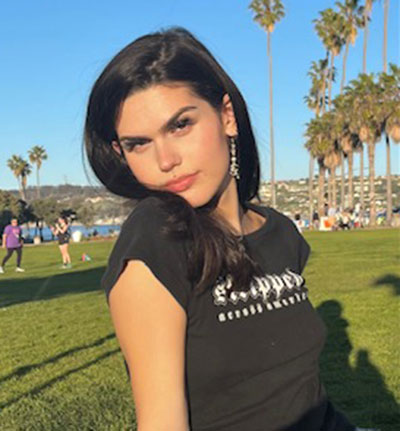
“We Believe in You” Award
Donors: PFLAG SDC Scholarship Fund
Marcella Pellecchia
My name is Marcella Pelleccia. I’m 17 years old, Italian-American, 3-years vegan, and born and raised in San Diego. I have strong aspirations of becoming a licensed cosmetologist and studying psychology. I take pride in my community and am motivated to be a successful role model for trans youth in the future.
I am submitting this essay in support of my application for the PFLAG Bill Hanson Community College Scholarship. I am eager to take advantage of the amazing opportunity provided by your program. As a proud member of the trans community, I am highly motivated to excel in life in the hope of inspiring other transgender teens to thrive.
My name is Marcella Pellecchia. I am a senior at the San Diego Metropolitan, Regional, and Technical High School with many interests, particularly cosmetology, psychology, and marketing. I will be attending the acclaimed Paul Mitchell Cosmetology School in San Diego after graduation, which will give me the training and opportunities to pursue my career as a hairstylist.
Ever since I can remember, hair and beauty have been my world and my greatest form of expression. I found comfort and joy from playing with my mom’s makeup and doing my babysitter’s hair as if it were my own. Naturally, society has a tendency to frown upon and suppress any feminine attributes that a young boy may possess. Being the ultra-feminine and unapologetic kid that I was, the negative reactions I experienced continued throughout my early school years. I grew up and began to face the societal pressures to fit in with my peers, and I did my best to suppress my femininity in order to protect myself.
Looking back, rather than seeing this as a hardship, I realized the adversities that come with being trans gave me an advantage. I am fortunate to have a supportive family situation that understands my struggles. My family guided me to professional resources that gave me the power and the opportunity to overcome many hardships. Having lived with such adversities made me a stronger and more confident person. For example, since 2021 I have been attending an internship at a high-end salon in Hillcrest, San Diego. Not only was I able to overcome social anxiety but I grew to become an active member of the most experienced team. In addition, during my senior year I am fulfilling the academic coursework to the fullest extent with currently a GPA for the 12 grade of 4.0.
Due to several adversities in my life, including the isolation and the sudden shift to online learning during pandemic, I did not do as well in the 11th grade, bringing my current weighted GPA to almost 3.0, but I am confident that when all grades for the second semester will be counted in, my final GPA will be far greater than 3.0. Moreover, to gain more direct work experience and to support myself financially I have also been working part time (all week-ends) at Vitality Bowls. I was recognized by the owner as a person of trust and given the responsibility of shift leader as well as opening and closing the store. Hence, thanks to the support and care I am receiving, I have now reached a stage in my life where I feel I can thrive in my career aspirations and could also help other trans kids to overcome the same emotional and practical barriers I had to face.
Oftentimes kids in my community are encouraged to join clubs and groups to directly be a resource to their peers. I was never compelled to these types of social organizations so I sought to find deeper connections within my community. I am a support for my trans friends, who it was obvious were less fortunate than me and did not have access to resources. I provided support and counseling for them, which I believe have made a huge positive impact on their lives.
Enhancing my personal career will not only fulfill my aspirations but perhaps would have a greater impact on my community empowering me with a louder voice to inspire and support those who are less fortunate. I know I am only a teenager but I feel I have great potential. If given the opportunity to fulfill my career goals I would surely deploy my social skills to be a leader and a resource to others in my community.

